HotReview.org Editor's
Picks
Shows Worth Seeing:
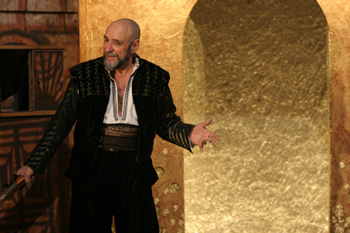
The Merchant of Venice
by William Shakespeare
The Jew of Malta
by Christopher Marlowe
The Duke on 42nd St.
229 W. 42nd St.
Box office: 212-239-6200
This Theatre for a New Audience pairing of Shakespeare’s
infamous “Jew play” with the downright disturbing
Christopher Marlowe play that inspired it is one of the most interesting
repertory scheduling ideas New York has seen in years. More important,
the productions are both extremely strong, with F. Murray Abraham
playing the villainous Jewish protagonist in both. Tickets have
become scarce for the remaining performances, but a strenuous
effort is worth the trouble. David Herskovits’ production
of the rarely performed Jew of Malta is admirably lucid,
raising all the right questions about exactly what this cagey
author was trying to say about Jews in particular or religion
in general. And Darko Tresnjak’s production of The Merchant
of Venice is superb, a tonic for anyone whose faith in the
art of directing may have been flagging. The use of anachronisms
(such as electronic devices) is, for once, actively and fruitfully
integrated into the action, and Abraham is positively frightening,
particularly in the culminating trial scene. The final scenes
are also of particular interest, casting an air of disharmony
over all the supposedly happy couples. Tresnjak’s decision
to leave Portia (Kate Forbes) in her male clothing for the ending
was quietly brilliant, implying that she has wholly understood
the nature of her competition for Bassanio's affections. Go and
watch how her behavior wipes the smug grin off Antonio's face
(Tom Nelis).
-------------------------------
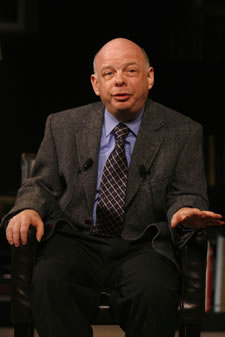
The Fever
Written and Performed by Wallace Shawn
The Acorn Theater
410 W. 42nd St.
Box office: (212) 279-4200
Most of the complaints you
may have heard about Wallace Shawn’s The Fever
are probably true. They’re also probably not the whole truth.
Yes, this meandering 90-minute monologue is an uncomfortable,
confrontational, even annoying portrait of liberal guilt that
is neither analytically rigorous nor especially moving as a portrait-study.
The speaker, called “the traveler,” is a fairly ordinary,
comfortable American who starts asking inconvenient questions
about how his privileged existence—and by extension the
whole unjust distribution of wealth in the world—can be
morally justified. Trying to work this out, he travels to a poor
country mired in a messy revolution and becomes ill. His loosely
connected and possibly delusional memories and musings about how
the “haves” of the world do and ought to behave are
bookended by descriptions of him collapsed at the toilet in his
hotel room. What makes the work fascinating is the sheer chutzpa
of Shawn presuming to lecture savvy and generally liberal New
Yorkers like a parent haranguing a teenager. Seated in a leather
armchair and speaking steadily in his signature matter-of-fact,
nasal manner—after a half hour of hobnobbing with audience
members over champagne before the show—he is less like a
nagging voice of conscience than a sort of moral woodpecker tapping
away at the thick carapaces people build around their self-justifications.
In that sense, the show is a fascinating spectacle of raw provocation,
dressed up as a pleasant little chat in a friend’s living
room.
------------------------------------
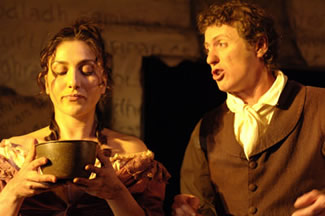
Translations
By Brian Friel
Biltmore Theatre
261 W. 47th St.
Box office: 212-239-6200
On the face of it, Brian Friel’s
Translations is a fairly straightforward and predictable
play about forbidden love that ends tragically under historically
prescient circumstances. A young British lieutenant, sent to County
Donegal in 1833 to help make a new map of the area, falls for
a local beauty named Maire whose people won’t tolerate the
union. The mapping project has obvious military importance, but
the officers carrying it out seem cultivated and harmless enough—until
they’re provoked, that is. What gives the play its sharp
emotional edge, though, is the way Friel mixes language differences
into the political and romantic soup. The action takes place in
an old barn used as a school for adults—a common institution
known as a hedge school—where Greek and Latin are taught,
but not English. Lieutenant Yolland speaks no Gaelic and Maire
speaks no English, and since one of his jobs is to give the county’s
places new English names, he is drawn into loving the woman’s
language along with her, which amounts to betrayal of his employers.
That betrayal, in turn, raises uncomfortable questions about just
what each side was actually protecting in the long and violent
Irish-English struggle to come: resistance to the English being
also resistance to modernity, and repression of the Irish being
also obliviousness to all the lofty principles of Empire. This
is a play that would lie dead as a lump of peat without a director
who knows its Irish milieu down to the smells and the particularities
of the shabby clothes, and without actors equipped to communicate
the trickery behind language. (There's a fascinating convention,
for instance, whereby the Irish characters speak English but are
understood to be speaking Gaelic). The Manhattan Theatre Club
is lucky to have Garry Hynes in the driver’s seat, and to
have such a superb cast and design team (the set and costumes
are by Francis O’Connor). Translations won’t
be done this well in New York for a long time to come, and it
should be seen while its here.
------------------------------------
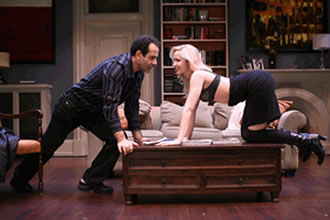
The Scene
By Theresa Rebeck
Second Stage Theatre
307 W. 43rd St.
Box office: (212) 246-4422
Theresa Rebeck is one of the strongest
storytellers currently writing for the American theater. Her plays
have a shotgun efficiency, honed during years of TV-writing, and
she has carved out an arena of topical specialization with her
biting observations about the power dynamics of male-female relations.
One reason her new play, The Scene, packs such a big
punch is that it draws energy from both of the sources just mentioned.
The tale of a 19-year marriage and still older friendship destroyed
by the transparent opportunism of a 20-something blonde bimbo
is classic Rebeck: intelligent men rendered idiotic by sexual
attraction, life-destroying betrayals tucked into innocuous turns
of speech, careerism as social pathology. There’s deeper
than usual revulsion here, however, at the vacuity of the television
world that Rebeck’s actor-character Charlie (played by Tony
Shalhoub) painfully tries to negotiate, and this depth of disgust
could only come from Rebeck’s personal experience in Hollywood.
Shalhoub’s 5-minute tirade about the inanity of a pilot-script
is a fabulous tour-de-force, reason enough to see the show, and
Anna Camp’s portrayal of the possibly not-so-dumb airhead
is also spot-on. Directing this work well was a tough balancing
act, requiring equal sensitivity to both the horrors and the attractions
of Rebeck’s circumstances, and Rebecca Taichman did a splendid
job with it. The Scene comes off as the best new play
staged in New York so far this season.
------------------------------------
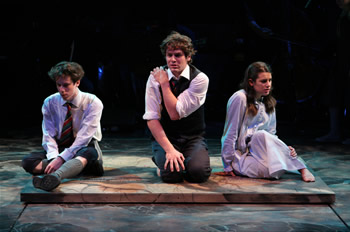
Spring Awakening
Based on the play by Frank Wedekind
Book and Lyrics by Steven Sater
Music by Duncan Sheik
Eugene O'Neill Theatre
230 W. 49th St.
Box office: (212) 239-6200
In some ways, Steven Slater and Duncan
Sheik’s musical version of Wedekind’s 1891 classic
Spring Awakening is more comfortable on Broadway than
it was downtown at the Atlantic Theater. Transfer to the commercial
context completes and validates the process of neutralizing the
play’s provocativeness, which more than a century of changing
sexual mores had all but accomplished in any case. Part of what
makes this buoyant and superbly executed show work so well is
its shrewdness about anachronism. The costumes, characters and
spoken lines—say, 30 percent of the action—are all
firmly rooted in the 19th century, but the music and song lyrics
are just as unabashedly contemporary. Thus, it never seems to
matter that the major plot calamities come down to lack of information
about sex that is unimaginable in present-day Germany or America.
The music tells a pulsing, wholly up-to-date story about burgeoning
sexuality that may not be avant-garde but nevertheless feels timeless
and authentic. The score by Duncan Sheik holds up impressively
on a second hearing: a mix of pop and alternative rock (think
Kelly Clarkson morphing into Husker Du and Yo La Tango), with
three or four songs sticking in mind long after the final curtain.
The marvelous young cast still performs with infectious fervor,
and the focus of Michael Mayer’s direction and Bill T. Jones’s
choreography is even more apparent on the bigger stage. Spring
Awakening isn’t really Wedekind, but it’s an
evening of surprising emotional power that sparkles in the end
on a simple plane of wonder.
